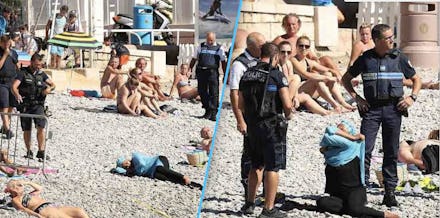France's burkini ban is an ugly reminder of tension between Muslim women and the police

Several photos of armed French policemen forcing a Muslim woman to disrobe on a beach in Nice, France, have gone viral.
The photo is horrifying. A Muslim woman was wearing a hijab, a tunic and long leggings on the Promenade des Anglais — the site of the Bastille Day attacks. The modest attire is similar to a burkini, a full-body wetsuit that's been banned in several European cities.
Four French police officers, equipped with firearms and pepper spray, stood over the woman as she stripped off her clothes.
The burkini, which is shorthand term for "burqa" and "bikini," is hooded swimwear that adheres to the modest attire many hijab-wearing Muslim women follow. Anti-Muslim sentiments in France have led to a law that criminalizes the burkini, banning them in public beaches and using coercion to enforce the regulation of women's bodies.
French officials and supporters of the ban argue that the intention is to empower Muslim women by bringing them to the age of modernity and encouraging them to integrate into French society — but this integration strategy is counterproductive.
The burkini is seen as progressive by many Muslim women, since it allows them to go on beach and swimming pool outings while also adhering to their Islamic traditions. In other words, the burkini gives Muslim women the freedom to modernize their Muslim lifestyle. By crushing that freedom for Muslim women, rather than support integration, France further alienates the Muslim community.
France's objectification of Muslim women's bodies has a long history.
In 1830, France began its occupation of Algeria, which lasted for 132 years. Throughout the colonial occupation, over 1.5 million Algerians were killed in airstrikes and massacres, according to the Guardian, and hundreds more were tortured in the streets of the North African country.
During that time, postcards of naked Muslim women from Berber villages were plastered across the French-occupied Algeria as propaganda to support their colonialism. Patronizing slogans and public service announcements telling Muslim women that they're beautiful and need to unveil themselves were just as common. Muslim women in Algeria were also forced to disrobe, and many were brutally raped by French soldiers during the occupation.
Now, French officials are on a tear to condemn the burkini. More than a dozen cities have announced bans on burkinis in response to recent terrorism attacks. In Cannes, officials have said that the swimsuits don't adhere to France's secularist values. David Lisnard, the mayor of Cannes, also claimed women wearing burkinis and modest beachwear "ostentatiously" showed religious affiliation at a time when terrorists have targeted France and their houses of worships.
Sarah El Attar, a French-Moroccan documentary filmmaker, said that the woman in the photo represents every French Muslim woman in the face of France's crackdown on their religious garments.
"It broke my heart," El Attar told Mic. "I don't wear the hijab myself, but I felt like it was me on the beach. I felt her humiliation; I felt her despair and sadness."
Khadija Mehter, a Muslim social justice activist in Washington, D.C., said the viral photo represents racism and sexism.
"Women being coerced out of clothes is not just violence, but it is sexual violence as it is directed at them as women," Mehter told Mic. "These photos prove how deeply racism and gendered racism at that, is embedded in their society and carried out by the state with the threat of tear gas and weapons standing by if women don't comply."
There are sweeping generalizations and claims made that wearing religious garments leads to terrorism. As for France's burkini ban, there is no evidence that promoting "secularism" will reduce terrorism either.
Some supporters also say that women shouldn't be forced to wear religious garments and that in those theocratic societies, women's rights are denied. They are absolutely right.
However, to use that argument to justify a morality police on burkini-clad Muslim women does not promote freedom. Instead the ban strips away women's agency.
The French Republic's motto is "liberté, egalité, fraternité." But is policing women's bodies because of their religious faith reflective of liberty, equality or fraternity? Definitely not. We should call it what it is: racial profiling in the name of safeguarding the French republic.